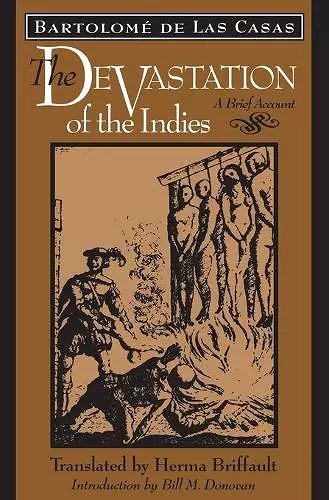The Devastation of the Indies
A Brief Account
Bartolomé de Las Casas author Herma Briffault translator Bill Donovan editor
Format:Paperback
Publisher:Johns Hopkins University Press
Published:1st Feb '92
Currently unavailable, and unfortunately no date known when it will be back

The book's sensational effect provides an early example of the power of the press... The topicality of the book is monstrous, has a penetratingly contemporary smell to it. [But] Las Casas is not our contemporary. His report treats of colonialism in its earliest stage; that is, of robbery pure and simple, of unconcealed plundering. -- Hans Magnus Enzensberger
Five hundred years after Columbus's first voyage to the New World, the debate over the European impact on Native American civilization has grown more heated than ever. Among the first—and most insistent—voices raised in that debate was that of a Spanish priest, Bartolomé de Las Casas, acquintance of Cortes and Pizarro and shipmate of Velasquez on the voyage to conquer Cuba. In 1552, after forty years of witnessing—and opposing—countless acts of brutality in the new Spanish colonies, Las Casas returned to Seville, where he published a book that caused a storm of controversy that persists to the present day.
The Devastation of the Indies is an eyewitness account of the first modern genocid, a story of greed, hypocrisy, and cruelties so grotesque as to rival the worst of our own century. Las Casas writes of men, women and children burned alive "thirteen at a time in memoery of Our Redeemer and his twelve apostles." He describes butcher shops that sold human flesh for dog food ("Give me a quarter of that rascal there," one customer says, "until I can kill some more of my own"). Slave ship captains navigate "without need if compass or charts," following instead the trail of floating corpes tossed overboard by the ship before them. Native kings are promised peace, then slaughted. Whole families hang themselves in despair. Once-fertile islands are turned to desert, the wealth of nations plundered, millions killed outright, whole peoples annihilated.
In an introduction, historian Bill M. Donovan provides a brief biography of Las Casas and reviews the controversy his work produced among Europeans, whose indignation—and denials—lasted centuries. But the book itself is short. "Were I to describe all this," writes Las Casas of the four decades of suffering he witnessed, "no amount of time and paper could emcimpass this task."
Bartolome de Las Casas's critical account of the impact that the Spaniards had on the new continent has long been recognized as one of the major sources for the study on the interaction between whites and American Indians during the sixteenth century. The present translation of The Devastation of the Indies is based on the 1965 edition and appeared for the first time in 1974. The reprint is now accompanied by a penetrating introduction by Bill M. Donovan... All this makes the introduction to a provocative and stimulating essay, preparing the reader for the actual text by Las Casas. -- Albrecht Classen Journal of the Rocky Mountain Medieval and Renaissance Association [Does] justice to the heartfelt message of Bartolome de las Casas. British Bulletin of Publications
ISBN: 9780801844300
Dimensions: unknown
Weight: 181g
152 pages